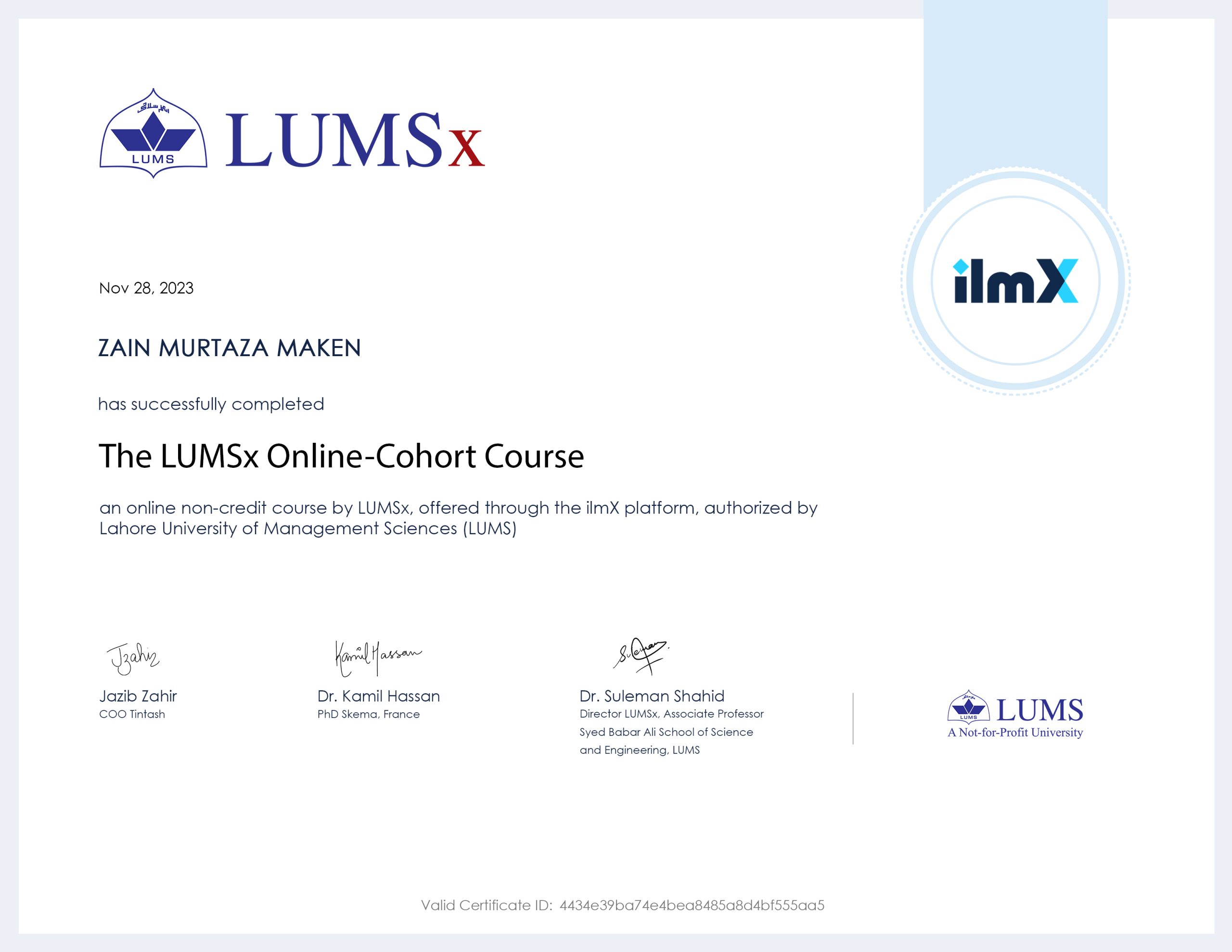Our Live Online Courses are Now Live! Learn More

At LUMSx, we believe in empowering you, our learners, with the skills to thrive in the ever-evolving field of Data Science.
The Beginner Track of this course is ideal if you’re just starting out or still developing confidence in core programming and analytical thinking. Assignments in this track are structured, guided, and focus on building essential skills through linear, well-defined workflows. You’ll work on approachable tasks like data cleaning, visualization, and result interpretation, without the pressure of writing complex algorithms or dealing with abstract logic.
COURSE INFORMATION
Are you curious about the world of data science but not sure where to start? Do you want to unlock the secrets of data analysis and drive informed decisions? Are you looking to upskill and take your career to the next level? Whether you’re here to explore potential career pathways or build foundational expertise, we’re thrilled to have you join our course!
Embark on an exhilarating journey into the heart of data science, where insights and innovations converge to shape the future. Are you ready to unravel the mysteries hidden within the vast realms of data?
Together, we’ll explore descriptive statistics and uncover the intricacies of data biases. We’ll then dive into the art of statistical inference and machine learning, where hypotheses are tested and models are built to learn from data. You’ll engage with concepts like regression, classification, and algorithmic decision-making, all while developing the skills to process and analyze data at scale, with care, ethics, and precision.
This is a cohort-based course, meaning you’ll attend alongside a group of peers with a fixed start and end date, allowing for real-time interaction with the course team during live sessions. The course includes live tutorials, interactive sessions with the instructor, and discussions with industry experts in the field of Data Science.
So, what are you waiting for? Choose your track and let’s get started!
By the end of this course, learners will be able to:
This course is part of the Data Science Specialization. “Learn More” about how to enroll in the specialization



Dr. Ihsan Ayyub Qazi is a Full Professor of Computer Science at LUMS. He earned…
Dr. Ihsan Ayyub Qazi is a Full Professor of Computer Science at LUMS. He earned…
In this module, you will get an introduction to the field of data science, the essence of data, and the importance of the data science lifecycle which covers the essential stages involved in any data science project. You will discover why data science is essential in today’s data-driven world, learn how to extract meaningful insights through data analysis, and get a sneak peek of the exciting course modules that lie ahead. Whether you’re new to the subject or looking to refresh your knowledge, this module is your gateway to unlocking the power of data in making informed decisions and sparking innovation.
This module equips you with the skills to identify and address biases in data analysis and utilizes the Python for Data Science (Pandas) library for efficient data processing, setting a solid foundation for your data science journey. In particular, you will learn about summarizing and interpreting large amounts of data using descriptive statistics to understand measures of centrality and variability in datasets. Furthermore, you’ll delve into effective data design techniques, incorporating sampling strategies and survey designs, to minimize bias in data science projects, complemented by practical case studies. Finally, you will be introduced to Pandas. You’ll learn how to read data into DataFrame structures, how to query these structures, and how to index, merge, and group data effectively.
This module consists of one live session with our Research Assistant, one data assignment and one session with the instructor. The live tutorial will provide you with hands-on experience under the guidance of our Research Assistant. During this session the research assistant will conduct a programming demonstration. You will get a chance to interact with the course team and your peers through this live online session. The data assignment in this module is meant to reinforce practice and evaluate understanding of key programming concepts. The live session with the instructor at the end will aim to answer any course-related questions you might have, under the guidance of Dr. Ihsan Qazi.
In this module, you’ll explore the essentials of Data Cleaning, Exploratory Data Analysis (EDA), Data Visualization, Text Analysis and Relational Databases. You will learn how to prepare and examine data to reveal hidden insights. You will learn about the principles of data visualization and how to articulate data narratives visually. You’ll also advance your skills with data transformations and text analysis. Finally, you will be introduced to basics of relational databases and the Structured Query Language (SQL), focusing on schemas, joins, and sampling. This streamlined journey equips you with crucial skills for insightful data analysis and management.
This module consists of one live session and one data assignment. The live tutorial will provide you with hands-on experience under the guidance of our Research Assistant. During this session the research assistant will conduct a programming demonstration. You will get a chance to interact with the course team and your peers through this live online session. The data assignment in this module is meant to reinforce practice and evaluate understanding of key programming concepts.
This module offers a thorough introduction to data analysis techniques and research methodologies for making informed, data-driven decisions. In particular, you will learn about Causal Inference and Statistical Inference to uncover causal relationships between variables and assess the reliability of data. You will learn about randomized control trials, quasi-experimental methods, and evidence-based policymaking. You will learn about hypothesis testing, p-values, and model assessment. Practical exercises on A/B testing and bootstrap sampling will enhance your ability to compare data confidently. Additionally, you will grasp the importance of sample size and power in data studies.
This module also contains one session with the industry expert where you will discover how Data Science is transforming various industries and is shaping future trends. You will also gain practical insights into how Data Science drives real-world solutions. The live session with the instructor at the end will aim to answer any course-related questions you might have, under the guidance of Dr. Ihsan Qazi.
This module consists of one live session with our Research Assistant and one data assignment. The live tutorial will provide you with hands-on experience under the guidance of our Research Assistant. During this session the research assistant will conduct a programming demonstration. You will get a chance to interact with the course team and your peers through this live online session. The data assignment in this module is meant to reinforce practice and evaluate understanding of key programming concepts.
Upon completion of the course, you receive a signed certificate from the institute. You can share this certificate in the certifications section of your LinkedIn profile, on printed resumes, CVs, or other documents.

When you click on the ‘Enroll Now’ button, you will be asked to register online. Once you have completed your online registration, you will proceed to the payment section where you can choose from three options:
1. Pay via bank: You will be able to instantly download a fee voucher for hassle-free bank deposits.
2. Pay online: By opting for ‘Pay Online’, a voucher will be automatically generated with a simple click to swiftly complete the payment.
3. Pay in instalments: LUMSx is an official partner of the KalPay Taleem team, which offer an instalment facility for learners. If you would like to avail this option, please complete the online registration form and select the option ‘Pay in instalments’. For more information, contact taleem@kalpayfinancials.com or call at 0328 3044414
A variety of assessments will be included, comprising self-assessments, brainstorming exercises, and organizational assessments. These assessments are designed to provide a holistic learning experience.
Plagiarism of any kind will not be tolerated in this course. All learners are expected to complete their work independently and uphold the highest standards of academic integrity. Copying code or assignments from a fellow learner, or allowing others to copy your work, is considered a serious violation of these rules. If you are found engaging in plagiarism, you will be immediately unenrolled from the course without exception and will not receive the certificate or a fee refund.
Yes. Please follow the instructions at the end of the course to request a printed certificate.
If a course offered by LUMSx is cancelled or postponed due to reasons such as insufficient enrollment or unforeseen circumstances, the university will provide a refund for any registration or processing fees paid. This ensures that participants are fairly compensated in the event of course changes beyond their control.
This course is perfect for you if:
-You’re a student looking to gain a competitive edge in the job market
– You’re a professional seeking to transition into a data science role
– You’re eager to gain practical skills in data analysis and pipeline building
– You want to learn from industry experts and connect with like-minded individuals
– You’re looking for a flexible online course that fits your schedule
This course is ideally suited for people with some preliminary background in programming:
-Basic knowledge of programming language will be assumed.
-Introductory knowledge of probability, statistics, and linear algebra will be assumed.
This is a cohort-based course, meaning you’ll attend alongside a group of peers with a fixed start and end date, allowing for real-time interaction with the course team during live sessions. The modules will unlock periodically so that you are working on the same parts of the course along with your peers every time. You will have access to 110 videos that you can watch at your convenience on this platform. So basically, 90% of the course is self-paced and 10% of the course has live sessions.
The course includes 4 live tutorials, 3 virtual office hours, one live session with industry experts, interactive elements like drag and drop activities and flash cards, 8 quizzes, and 4 data assignments. It also includes videos that you can watch at your convenience on this platform. Additionally, this course has some foundational resources in case you want to bridge any gaps in your knowledge or refresh your understanding in concepts like calculus, probability, statistics or programming. To enrich your learning further, we have provided you with some additional resources as well.
Yes, your progress will be saved, and you can resume from you left off but please be mindful of the fact that this is a cohort-based course, meaning you’ll attend alongside a group of peers with a fixed start and end date, allowing for real-time interaction with the course team during live sessions. The modules will unlock periodically so that you are working on the same parts of the course along with your peers every time.
To complete the course and gain your certificate, you must obtain an aggregate score of 60% on the quizzes and programming assessments.
Yes, you will get a certificate at the end of this course.
You must watch all the videos, attempt all the data assignments and quizzes, and attend all the live sessions to get a course certificate.